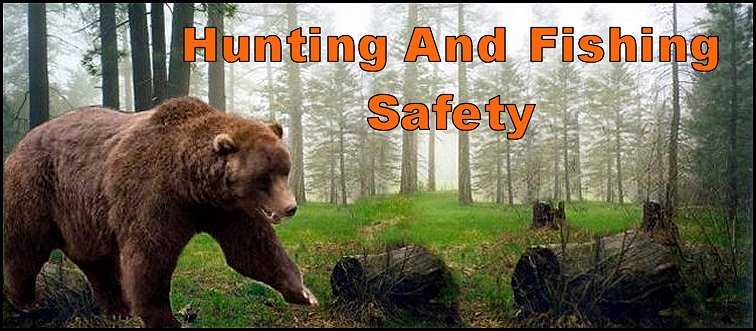Dan Lewis (907) 980 - 6423
Loading
© 1998 Backcountry Taxidermy - All Rights Reserved
Website Design by MCH Outdoor Web Design
Hunter Safety - Continued
Hunting has survived the modernization of civilization. In fact, it has flourished into one of the most popular pastimes and hobbies in the world. Unfortunately, one of the world's favorite past times can also be one of its most dangerous.
Every hunter /fisherman should know some basic things before heading out into the field or on the water.
Information when you
are going in the field
or on the water.
SURVIVAL
How To Stay Alive if Lost, Hurt or Stranded -- The following scenarios and others like them play out over three thousand times per year in the United States. Folks heading outdoors in search of adventure don't plan on getting lost or hurt in the wilderness. It can happen to the best of us, and when it does, people underestimate the challenges of the wilderness and overestimate their own ability.
Fairbanks snowmachiner John Johnston has never been forced to bivouac (camp in the open) on the trail or in the mountains during 30 years of riding in Alaska, but he’s more than prepared to do so if that situation arises.
Have you ever been in a survival situation? Most of us have not. Would you know how to survive in the wilderness in a crisis? Believe it or not, most of us would not. With the advent of Global Positioning Systems (GPS) we've been lulled into a false sense of security, thinking that we can escape any predicament by following our handy little electronic devices to safety.
Hunters and outdoor enthusiasts headed to the field should be aware of the threat of hypothermia and how to combat it. Hypothermia occurs when exposure to the wind, cold and wetness drain heat from the body faster than it can be produced...
Hunting and Fishing in Bear Country
Angler & Hunter Tips On Staying Smart in Bear Country -- Posted 05/13/16 Anglers and hunters need to be extra cautious while recreating in bear country. Because they are often moving quietly, they are at higher risk of surprising bears while they are in the field. Nothing will guarantee your safety in bear country, but knowledge of bears and proper behavior greatly reduce your risk. Here is some information to help both from a bad encounter...
Boating Safety Tips
Drowning is the biggest safety risk for waterfowl hunters. Each year, more waterfowl hunters die from drowning than from other types of hunting accidents. Swamping, capsizing and falling overboard are all common factors leading to these deaths, but in nearly all cases the hunter would have survived had they been wearing a life jacket. Other water safety tips for duck hunters include...
Ten Important Tips Including Safety For Watercraft Users -- Whether you’re planning to take that new watercraft out for some sightseeing, do some fishing or waterfowl hunting, all new and veteran watercraft users are encouraged to remember the following 10 tips to remain safe on the water.
Boating Safety Tips -- Holidays generally means a lot of boats on local waterways. “We want everyone to have a great time and enjoy their time on the water this weekend. “We also want everyone to be safe and make it back home alive.” Here are some important Boating Safety Tips:
Cold Water Dangers to Hunters, Anglers -- Water does not have to be near freezing to kill, it only has to be colder than a person to cause potentially fatal hypothermia. Waters are cold now with waterfowl hunters gearing up for a new season, and many anglers are still fishing. Overloaded boats and failure to wear life jackets are leading reasons states typically loses a couple of waterfowl hunters every year.
TURKEY HUNTING
Turkey Hunting Safety Tips -- Successful hunting trips require a combination of skill, patience and most importantly, preparation. As turkey season approaches, Hunters are encouraged to review the following turkey hunting season safety precautions
HOW TO CROSS A RIVER SAFELY
“Type one is you’re going to walk across and type two is the kind you know you are going to be swimming across the river.“Type one can turn into type two real fast.” When that happens, you have to be prepared for it. One of the biggest dangers of hunting, fishing or traveling in Alaska or anywhere in North America — crossing cold, strong, glacial-fed or rain-swollen rivers.


